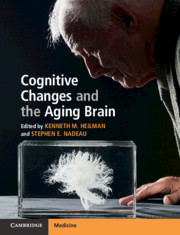Book contents
- Cognitive Changes and the Aging Brain
- Cognitive Changes and the Aging Brain
- Copyright page
- Dedication
- Contents
- Contributors
- Chapter 1 Introduction
- Chapter 2 Anatomic and Histological Changes of the Aging Brain
- Chapter 3 Cellular and Molecular Mechanisms for Age-Related Cognitive Decline
- Chapter 4 Neuroimaging of the Aging Brain
- Chapter 5 Changes in Visuospatial, Visuoperceptual, and Navigational Ability in Aging
- Chapter 6 Chemosensory Function during Neurologically Healthy Aging
- Chapter 7 Memory Changes in the Aging Brain
- Chapter 8 Aging-Related Alterations in Language
- Chapter 9 Changes in Emotions and Mood with Aging
- Chapter 10 Aging and Attention
- Chapter 11 Changes in Motor Programming with Aging
- Chapter 12 Alterations in Executive Functions with Aging
- Chapter 13 Brain Aging and Creativity
- Chapter 14 Attractor Network Dynamics, Transmitters, and Memory and Cognitive Changes in Aging
- Chapter 15 Mechanisms of Aging-Related Cognitive Decline
- Chapter 16 The Influence of Physical Exercise on Cognitive Aging
- Chapter 17 Pharmacological Cosmetic Neurology
- Chapter 18 Cognitive Rehabilitation in Healthy Aging
- Chapter 19 Preventing Cognitive Decline and Dementia
- Index
- References
Chapter 19 - Preventing Cognitive Decline and Dementia
Published online by Cambridge University Press: 30 November 2019
- Cognitive Changes and the Aging Brain
- Cognitive Changes and the Aging Brain
- Copyright page
- Dedication
- Contents
- Contributors
- Chapter 1 Introduction
- Chapter 2 Anatomic and Histological Changes of the Aging Brain
- Chapter 3 Cellular and Molecular Mechanisms for Age-Related Cognitive Decline
- Chapter 4 Neuroimaging of the Aging Brain
- Chapter 5 Changes in Visuospatial, Visuoperceptual, and Navigational Ability in Aging
- Chapter 6 Chemosensory Function during Neurologically Healthy Aging
- Chapter 7 Memory Changes in the Aging Brain
- Chapter 8 Aging-Related Alterations in Language
- Chapter 9 Changes in Emotions and Mood with Aging
- Chapter 10 Aging and Attention
- Chapter 11 Changes in Motor Programming with Aging
- Chapter 12 Alterations in Executive Functions with Aging
- Chapter 13 Brain Aging and Creativity
- Chapter 14 Attractor Network Dynamics, Transmitters, and Memory and Cognitive Changes in Aging
- Chapter 15 Mechanisms of Aging-Related Cognitive Decline
- Chapter 16 The Influence of Physical Exercise on Cognitive Aging
- Chapter 17 Pharmacological Cosmetic Neurology
- Chapter 18 Cognitive Rehabilitation in Healthy Aging
- Chapter 19 Preventing Cognitive Decline and Dementia
- Index
- References
Summary
Early diagnosis and treatment, delay of progression, and prevention of Alzheimer’s disease (AD) are all interrelated and are targets for pharmaceutical and behavioral interventions. Depending on their mechanisms, medications directed at treatment or aimed at slowing the progression of disease may be candidates for disease prevention as well. As we have learned more about AD over the past two decades, experienced clinicians have become increasingly skilled at diagnosing AD earlier in the course of this disease and on the basis of milder symptoms. An isolated symptom of memory loss, termed mild cognitive impairment (MCI), appears to be one of the most common initial presentations of AD. Cerebrospinal fluid (CSF) analysis, neuroimaging, and blood biomarkers hold promise for improving diagnostic certainty even in cases with mild cognitive symptoms. Researchers worldwide are seeking to identify treatments or changes in lifestyle (e.g., diet, exercise, and mental activity) that would decrease the risk of developing AD.
- Type
- Chapter
- Information
- Cognitive Changes and the Aging Brain , pp. 291 - 306Publisher: Cambridge University PressPrint publication year: 2019
References
- 2
- Cited by

